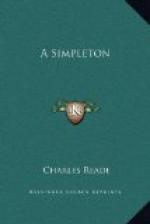At last he got an offer of twelve hundred pounds for the small stones, and the same for the large yellow stone, and nine hundred pounds for the second largest stone. He took this nine hundred pounds, and instantly wrote to Phoebe, telling her he had a sudden inspiration to bring the diamonds to England, which he could not regret, since he had never done a wiser thing. He had sold a single stone for eight hundred pounds, and had sent the doctor’s four hundred pounds to her account in Cape Town; and as each sale was effected, the half would be so remitted. She would see by that, he was wiser than in former days. He should only stay so long as might be necessary to sell them all equally well. His own share he would apply to paying off mortgages on the family estate, of which he hoped some day to see her the mistress, or he would send it direct to her, whichever she might prefer.
Now the main object of this artful letter was to keep Phoebe quiet, and not have her coming after him, of which he felt she was very capable.
The money got safe to Cape Town, but the letter to Phoebe miscarried. How this happened was never positively known; but the servant of the lodging-house was afterwards detected cutting stamps off a letter; so perhaps she had played that game on this occasion.
By this means, matters took a curious turn. Falcon, intending to lull his wife into a false security, lulled himself into that state instead.
When he had taken care of himself, and got five hundred pounds to play the fool with, then he condescended to remember his errand of mercy; and he came down to Gravesend, to see Mrs. Staines.
On the road, he gave his mind seriously to the delicate and dangerous task. It did not, however, disquiet him as it would you, sir, or you, madam. He had a great advantage over you. He was a liar—a smooth, ready, accomplished liar—and he knew it.
This was the outline he had traced in his mind: he should appear very subdued and sad; should wear an air of condolence. But, after a while, should say, “And yet men have been lost like that, and escaped. A man was picked up on a raft in those very latitudes, and brought into Cape Town. A friend of mine saw him, months after, at the hospital. His memory was shaken—could not tell his name; but in other respects he was all right again.”
If Mrs. Staines took fire at this, he would say his friend knew all the particulars, and he would ask him, and so leave that to rankle till next visit. And having planted his germ of hope, he would grow it, and water it, by visits and correspondence, till he could throw off the mask, and say he was convinced Staines was alive: and from that, by other degrees, till he could say, on his wife’s authority, that the man picked up at sea, and cured at her house, was the very physician who had saved her brother’s life: and so on to the overwhelming proof he carried in the ruby ring and the letter.




